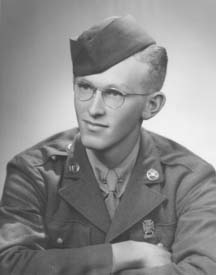The Ardennes Offensive began on December 16,1944. The weather was bitter cold, foggy and dreary. All was quiet until Dec. 16 when the Krauts attacked. There was chaos that slowly resolved itself into grim determination, desperation and numbness…you got it. “The Bulge” refers to the progress of the German offensive and to how far they pushed our lines back. Winston Churchill is quoted as saying, “This is undoubtedly the greatest American battle of the war and will, I believe, be regarded as an ever famous American victory.” Two million men were involved in this the largest land battle the US Army has ever fought.
We were brought down to the St.Vith area. Our missions depended on the targets spotted. We wouldn’t fire non-stop unless necessary. We were limited to the ammunition available to us. Sometimes we’d get a FIRE MISSION at various times day or night. At chow time half of the gun crew would go to the rear to get fed so the rest of us had to carry out the mission. Then, sometimes, by the time we had a chance to be fed, all the food was gone so our dinner was sometimes just a piece of bread and coffee. Or we ate combat rations.
As far as getting any hot food from December 1944 to February 1945 our cooks were able, once in a while, to bring hot food up in insulated Mermite cans. The US Army has a tradition of always trying to get a turkey dinner to the troops on Thanksgiving and Xmas with all the trimmings. Kinda hard to serve it up properly in that cold weather with everything served onto one’s cold mess kit all together with dessert slopped on top. That was special. Night time could be beautiful. The searchlights would go on to create artificial moonlight for our Infantry lads. There would be flares fired and the magnesium flares would light up an area as they came down on little parachutes.. Machine gun tracers from our anti-aircraft guns would make pretty patterns in the sky because every 5th round had the rear hollowed out and packed with a chemical that glowed when fired. All this was to help the gunner zero in on his target. And the sounds that filled the night: Of weapons firing by the Infantry machine guns, mortars going off and other artillery pieces firing. And then the krauts would send over “Checkpoint Charlie” at night. He’d come over, drop a few flares and take, we think, photos, drop a bomb or two, and with his distinctive engine sound disappear back to his own lines. Sounded like the engine needed a tune-up.
One memory I’ve had of this Xmas time was firing a mission and the FDC guys (Fire Direction Center) said, “You guys know that tonight’s Xmas Eve?” That’s how we found out during the winter of ‘44. Since our gun positions were generally in the open or at the edge of trees we were pretty well exposed to the chilling wind. Frostbite casualties were common due to a lack of proper clothing and boots. I wouldn’t know how cold it got without having a thermometer but it was the coldest winter in Europe in 40 years. Records show that temperatures plummeted from 40 degrees down to minus 10 to minus 20 F at night. Brrrr.
Bradley and even Ike felt the war would be over by Dec. 1944 so they had the manufacturing and shipment of winter clothing stopped. Some supplies were in warehouses in France but the rear echelon guys got into those. All we had were leather boots and were supposed to massage each other’s feet to prevent frostbite. The medical Dx was “frozen feet” but in WWI it was called “trench foot”. Not much more than commiseration with my buddies held me together mentally during times of hardship as we were all in it together. Our bedding was just a wool Army blanket each. Yes, just one blanket. In December they issued us a mummy style sleeping bag, which was a blanket with an outer shell and a zipper. Eventually they got wool gloves, a wool scarf, a sweater and galoshes or overshoes to us at the front. It was joked that it was so cold that it would freeze the balls off a brass monkey. Don’t know where that expression came from but it always got a laugh.
After we would get our howitzer into firing position, next we would did a hole for the projectiles and powder charges, and then dig our personal fox holes, then dig a small slit trench, the width of a shovel blade, and thus we could squat and straddle the trench, cover it with some dirt we had dug. TP was slid onto the handle of the shovel, which was jammed into the dirt we had dug out. It was quite an experience to squat in icy cold weather and expose your butt to the cold.
The Belgians generally cleared out as they were fearful of the reprisals from the Germans. Those few who stayed opened their homes to the troops. If we stayed for a few days it would give us a chance to contact a farmer in France, N. Belgium, or Holland for cider, wine, or females. We tried to lure them to our area with promises of food, cigarettes. Not much success. We could not talk with any German for fear of a fine of $65 (a months’ pay for privates). On December 23 the skies finally cleared and all we heard were aircraft engines and saw contrails and there was cheering at the event. Our guys parachuted in ammo, food and medicine to the encircled troops at Bastogne but unfortunately, the Krauts got some of the chutes. After the war a German soldier reported that that he found a canned Hormel ham hanging from a parachute and had dined with a Belgium family that Christmas.
We pushed the Germans back into Germany and the Ardennes Offensive ended the beginning of February 1945. When December weather comes in with its cold and fog, even after 68 years, my thoughts drift to the Bulge experience and I shiver as I remember those Bulge weather days of suffering. We moved eastward quickly and eventually found ourselves below Magdeburg, Germany in support of the 2nd Armored Division and the 83rd ID which both had bridges across and troops on the east side of the Elbe river until we were ordered to hold our positions. This is now April 1945.
We went “scrounging” in Germany but couldn’t go far. Some guys found weapons or other souvenirs. If we found food we feared it might be poisoned. Krauts knew we scrounged for wine and schnapps and would urinate into those bottles. Once in a small town in Germany I went scrounging for a door to put over my foxhole to prevent shrapnel from coming in. The house was untouched with even a beautiful crucifix on the wall and I spotted this grand piano. I was angry at the Germans so, in a fit of adolescent stupidity, I destroyed a good part of the piano with my carbine,so the residents would have something to suffer with. We prepared to move for occupation duties in Giessen, Germany.
We liberated several German concentration camps and witnessed the results of the atrocities. Unfortunately we gave the starving inmates our high calorie rations which caused them distress and even death. This liberating of POW and concentration camps came in our drive to the Elbe River. VE Day came May 8 and the Russians on the east bank of the Elbe River were celebrating. We could hear them yelling and firing into the air with their weapons. Flares were going off and an accordion was playing. I decided to take a lone journey across the pontoon bridge one day and got a ride in a jeep. On the east bank of the Elbe I saw a column of rough looking Mongolian troops, female traffic cops, and their kitchens pulled by horses. I thought, “I sure hope we never have to fight them.” Ourselves, on the west bank of the Elbe River did no celebrating as we were due to ship out to battle in the Pacific.
In Giessen we guarded first the Polish and then the Russian DPs (Displaced Persons) or manned the checkpoints on the Autobahn. One time we took a trainload of Russian DPs packed into boxcars into the Russian Zone. The four of us had a boxcar to ourselves, which was loaded up with Ten-in-One rations. Our journey was overnight to the edge of Czechoslovakia. We’d distribute the ration boxes to each car at mealtime stops. Our unit was broken up based on an individual’s point system and we were sent to one of the “cigarette camps” near La Havre for weeks of idleness while we waited for transportation home by ship.

